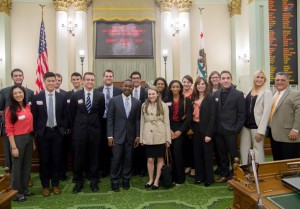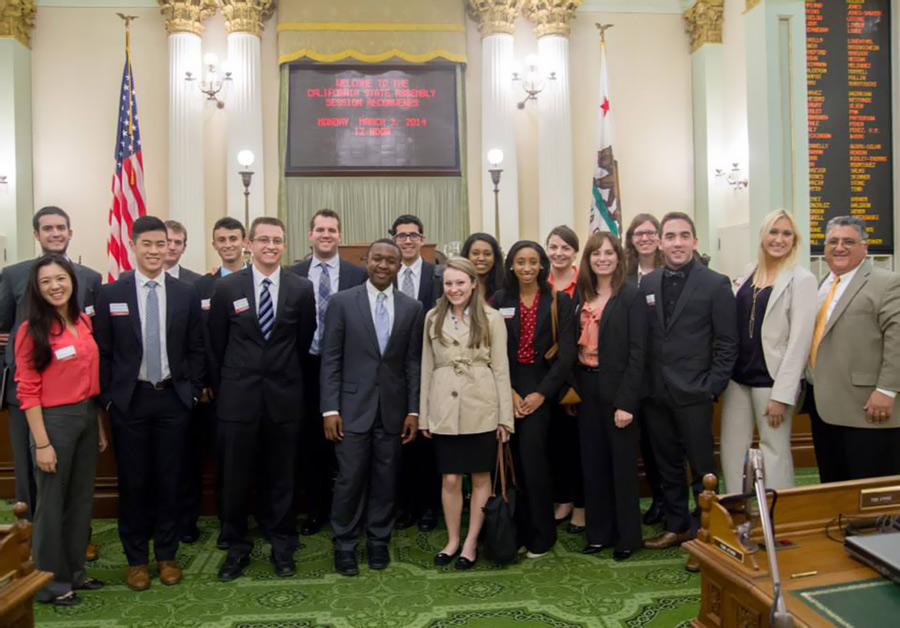Sacramento hosts USC students
Twenty-eight USC students attended the three-day Joseph R. Cerrell Sacramento Seminar in Political Leadership over the weekend. The seminar selected attendees from a competitive pool of applicants and took selected students on a three-day trip to California’s capital city to meet and learn from some of the state’s most prominent leaders.

Future leaders · Twenty-eight students from the Jesse M. Unruh Institute of Politics travelled to Sacramento for a three-day seminar with USC faculty members Anthony Portantino and Tony Strickland. The event focused on recent electoral reforms and the stressed the importance of bipartisanship. – Photo courtesy of Nathaniel Haas
The Jesse M. Unruh Institute of Politics sponsored and organized the seminar. Dan Schnur, who is taking a leave of absence from his position as director of the institute to run for California Secretary of State, said the seminar falls in line with the Unruh Institute’s mission to bring the student body and politics closer together.
“We believe very strongly that the best way to get students interested in politics, government and public service is to bring politics to campus,” he said. “The single most valuable thing that comes out of this program is that a number of the students who participated are going to go on and work in public service after they graduate.”
Students listened to a wide variety of panels and speakers, including a conversation with Darrell Steinberg, the president pro tempore of the California State Senate, and Evan Westrup, Gov. Jerry Brown’s press secretary.
The format of the seminar reflected the Unruh Institute’s commitment to bipartisanship and policy discussions. Not only did the selected students occupy a wide range of political perspectives, but also each panel brought together representatives from both sides of the aisle to create a conversation that presented the many sides of each issue.
Anthony Portantino, a former state assemblyman, and Tony Strickland, a former state senator who is now running for Congress, both teach a class at USC and accompanied the students to Sacramento. The duo participated in a panel on political leadership with John Myers, the political editor at ABC News 10 in Sacramento and Amy Chance, the political editor for the Sacramento Bee.
The panel, moderated by Schnur, examined notable upcoming elections and recent electoral reforms. Portantino said the reforms reveal that now is a critical time for students to pay attention to state politics.
“I think everybody agreed that we’ll get some clarity after the next election cycle as to how the top two and redistricting will affect politics going forward,” he said. “You guys are going to be on the cutting edge of that new paradigm.”
Strickland agreed and spoke of the impact the reforms have had on making candidates more moderate.
“Now, no longer is a Democrat or a Republican as an elected official in Sacramento or Washington, D.C. going to be able to know, ‘I’ve got my party’s nomination,’” he said. “I think, quite frankly, that’s one of the main reasons why a lot of the older members decided to quit.”
Students who attended the seminar, including Rachel Scott, a sophomore majoring in broadcast and digital journalism, said the experience provided opportunities to meet leaders and make connections that wouldn’t be possible at USC.
“I’d recommend this to anyone who has the slightest interest in politics — which doesn’t even have to be running for office,” Scott said. “Being up here for two days, I’ve gotten to network with around 30 people that I wouldn’t have met otherwise, from press secretaries to journalists and assemblymen.”
Nick Kosturos, a junior majoring in international relations, said the seminar was also about the chance to see state politics in action with students that were united by a common interest in politics.
“We’re all like-minded — we do care about public service and want to learn more about the system,” he said. “That natural curiosity allowed for discussions that happened after the panels that deepened our knowledge, since we were able to argue amongst ourselves.”
For Kosturos, forming bonds with the other attending students was the best part.
“The best part of the seminar was growing close to everyone,” he said. “We were able to develop relationships and forge bonds united by a common interest in state politics.”
Staff writer Nathaniel Haas was one of the students selected to attend the seminar.

